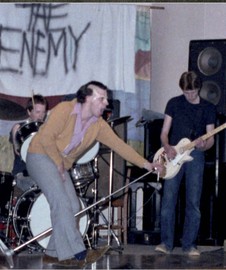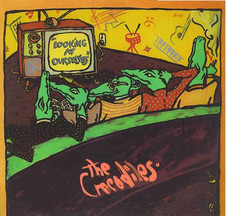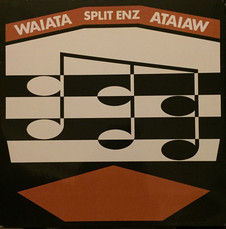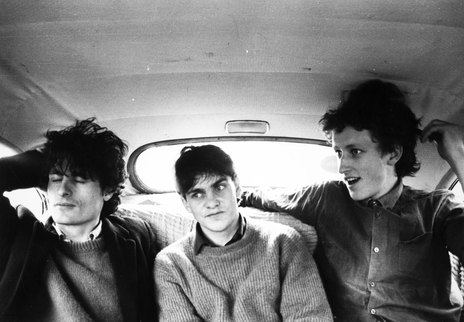Gentle, generous and gracious, Roy Colbert also had a puckish wit and could be a wicked raconteur. His letters and emails should be collected and published by – who else? – Otago University Press. Halfway through 30 sessions of radiotherapy in February 2017, he wrote to AudioCulture to say, “Feel fine. But hair falling out. Will be bald in two weeks, committed to a beanie for life, like The Edge. I will have to reassess U2.”
Shortly after it was launched in June 1977, Roy Colbert began contributing to Rip It Up. Co-founder and longtime editor Murray Cammick describes him as “certainly one of the valued early writers” of the magazine. “He made an invaluable contribution to the music scene and his community, as a music writer, retailer and as a person who cared for the well-being of others.”
Although often – and aptly - hailed as the “godfather of the Dunedin Sound”, Roy’s musical tastes were extraordinarily broad. For Dunedin’s Evening Star and Rip It Up he interviewed Led Zeppelin, Ray Davies of the Kinks, Gene Clark of the Byrds, and Tom Petty, among many others. For Rip It Up in the late 1970s and early ’80s he wrote eloquently on The Ramones, The Cramps, The Tubes, Cheap Trick, Bruce Springsteen, Echo and the Bunnymen, to mention just a few overseas acts. He could wax lyrical about Dunedin music of any era, be it 1950s rock’n’roll bands, hairy rock bands, and those that emerged during punk and recorded for Flying Nun. While mocking his own skills at the piano, he was very proud of his grandfather, Roy Spackman, church organist, music teacher and leg-break bowler.
But it is for his role nurturing and championing the Dunedin musicians associated with Flying Nun that Roy will be long remembered, so AudioCulture presents an EP of Roy’s greatest (New Zealand) hits by starting with a prescient review of The Enemy in Rip It Up’s seventh issue. Roy was, says Murray Cammick “never more perceptive than when he wrote of The Enemy in December 1977.”

The Enemy, Old Beneficiaries Hall, Dunedin (Rip It Up, December 1977)
Dunedin’s First New Wave Dance. The band take their name from the magazine and will soon have 20 original songs ready for Wednesday, November 16. A week before, the bass player leaves, and a friend is brought in. He’s played guitar before in bedrooms and things, but never on a stage. He’s never played bass guitar before.
The dance is held at the quaintly names Old Beneficiaries Hall. A portrait of the Queen on a chair. A few safety pins. A television humming on top of a speaker – later to have the band’s name inked on its blue glow. And a few hours of Pistols, Ramones, Stranglers, et al, to get everyone thinking the same way.
The band finally come on. The bass player is unbelievably fine. Total commitment. He’s also unbelievably important, because the guitar isn’t heard at all for the first 20 minutes, so Mick Dawson becomes not only the bottom of the garage through, but also the middle and the top.
Chris Knox sings and writes many of the songs. A natural lead singer for a New Wave band, and also a vehement critic
Chris Knox sings and writes many of the songs. A natural lead singer for a New Wave band, and also a vehement critic. The night before he’s heard bellowing at Hello Sailor for not satisfying him on an Iggy Pop number. He also bellowed at Lou Reed throughout the man’s Christchurch concert (not that Lou would really care) and Chris was and still is devoted to Lou Reed (not that Lou would really care).
Alec Bathgate plays guitar and Mike Dooley drums. Both just keep getting hotter and hotter as the crowd drunken and becomes more wildly converted to the throb from the stage.
The songs are simple, the words possibly quite good (some are forgotten and many inaudible) and the rhythms relentless. Proper punk music. Great titles too – ‘I Wanna Die With You’, ‘Jack Crap’, ‘Pull Down the Shades’, ‘Iggy Told Me’, ‘Lou Reed’, ‘Rainbow’, ‘Government Health Warning’, ‘I Just Can’t Get It Up’ and, of course, ‘We Are the Enemy’.
The crowd seems to love it. At least one Hello Sailor guitarist is seen, and when the music stops two hours later, he is seen to have moved two meters closer to the stage. And he’s smiling.
It was a real fun night. – Roy Colbert

The Crocodiles, Looking at Ourselves (Foolish/RCA), Rip It Up, December 1980
A more unified album than the debut with stylistic direction now seemingly sorted out. There’s still the feeling with the Crocs of older people making music for younger people while trying to retain credibility with older people (hien?) but the tunes are eminently catchable, snappy, and always direct without ever becoming Joe-90 simple.
‘Telephone Love’ is the obvious single, a good song. It looks great on TV. Side One even has a namecheck for the Librettos, while Side Two hangs together with special resilience, from the single on through the hooky ‘Learnt It From An Expert’, the rock’n’roll ballad ‘First Date’ (I expected a nick from Floyd Cramer’s ‘Last Date’ to be sneaked in here after hearing a snatch of ‘The Lonely Bull’ on album one) and Peter Dasent’s tale of the faceless Mister Big’s ‘Gangland’.
Musically, the Crocodiles’ bottom is a light one still, but instrumentally they’re thoughtful, skilled, and well arranged. Their ultimate strength is Jenny Morris who, as live viewing will attest, is as visually vital as she is aurally valuable. – Roy Colbert

Toy Love, Toy Love (De Luxe), Rip It Up, August 1980
When Todd Hunter last passed through Dunedin, heaving the rotting Dragon carcass behind him, he mentioned he’d really like to do something with Toy Love. They’ve got the songs, said Todd, and they’re GOOD songs. Todd got his wish, and nothing on this debut album, produced by him in Sydney, vilifies that belief. Above all, this record is crushing confirmation that Toy Love have songs to burn. There are 15 here, and even allowing for the fact that some date back to the 1977 Enemy embryo (and that band’s bass player Mick Dawson) the writing range is still astonishing. Imagine a Billboard reviewer with his box of labels grappling with this one – post-punk power, pure pop, macabre melodrama, whoop’n’holler bizarre bop, sublime ice-cold beauty, three-chord thunder, chaotic psychedelia … the bard could go on forever. And realise too there are a number of fine Toy Love songs not even ON this album. Whew.
So much for Toy Love (and Mick) as writers. As a record mirroring that ability, this is not quite in the same league – not that anyone, fervent followers and doubting dissenters both – really expected the full sweep of the band to make it onto vinyl at this stage. That full sweep, after all, covers a lot of ground.
There are times on this album when technically things do come together, usually on the slower, more dramatic and instrumentally spare material, but when the band are raging all five limitations are laid bare. During such moments we listen in vain for Dooley’s drum anarchy, the bass drum especially, we strain to hear the keyboards, and we wish Johnny Ramone had been brought in just to produce Alec. It sounds almost as though someone panicked every time the VU needles went into the red, not realising that the best rock’n’roll only starts there.
Back to the songs. Track placement must have furrowed a few brows, but a daunting task has been handled pretty well, thought the album should really end with ‘Frogs’, leaving the frantic ‘Fast Ostrich’ in the studio can for bootleggers to creep in and steal at night. As mentioned, the slower, more skin-crawly stuff has come up solidly, and it’s amazing that Chris Knox who, incidentally writes some damn fine lyrics, can still wring life out of such thousand-times played chestnuts as ‘Cold Meat’ and ‘Green Wails’. The same big plus goes to Knox – and band – for somehow getting a good cut down of ‘Shades’. Not definitive coz it’s too late for that, but at white-noise volume, this is at least magnificent. This song could still bring the New Zealand singles chart to its knees. Which leads me on to the album’s actual single, ‘Bride of Frankenstein’. More evidence of that off-the-wall writing ability, sure, but querulous stuff for the 45 market nevertheless.
The glorious pop visions of ‘Swimming Pool’ and ‘Ain’t It Nice’ have battled with the sobriety of the studio and the still-developing instrumental skills of the band – the result is a draw – and ‘The Crunch’, a song to open ANYTHING (a record side, a set, a day) is one of those ones Johnny Ramone should have been in on. ‘Don’t Catch Fire’ has a great, atmospheric opening but but when everyone climbs aboard to drive the anthemic rocker home, the amplifier has to be driven into clipping to get the required climax.
‘Bedroom’ I leave till last, coz it’s so good. With one of Knox’s best vocals, the keyboards swirl beautifully, and the drums reveal subtlety and taste hitherto untried for. Melodically, it’s the album’s supreme achievement.
I like the first Toy Love album a whole lot. Strengths and weaknesses have both been underlined, but if your criteria is songs, as mine ultimately always is, then you’ll find them here. Any overseas big-name big-dollar record producer who heard this one couldn’t fail to realise Toy Love have the machinery to move mountains. Someone’s just gotta turn on the power. – Roy Colbert

Split Enz, Waiata, Polydor (Rip It Up, May 1981)
The words of a departing drummer may be invalid, but Mal Green’s parting shot on Waiata, that the Enz were taking a big step and could easily fall flat on their faces, was a real appetite-whetter. ‘One Step Ahead’, happily retained for the album, certainly was brave. A masterly song, it delivered its melodic gifts slyly, demanding perseverance, and playing safe only at the bass-drums bottom. The new single ‘History Never Repeats’ is completely different, maybe not a great single, but assuredly a very good one. It drives, taking off in the middle and then surprising you with a burst of acapella before finishing with more guitar musicle than is normally found on four Enz songs.
“THE TWO FINNS ARE BEATLING DOWN THE HOME STRAIGHT, SHOULDER TO SHOULDER, HURLING DIAMONDS AT EACH OTHER AS THEY RUN. THE RACE IS A DELIGHT TO WATCH”
Brave? The thing the Enz have in their favour, which Springsteen – to name only one – hasn’t, is that they have consistently left themselves a ton of room in which to move. Consequently on Waiata they once again give us fresh song structures, new rhythms, all of which develop gradually but inevitably into a shape as orderly as it is loveable.
Tim Finn’s ‘Hard Act to Follow’ – written for a lady, not a brother – is a powerful, surging openier, but he does follow Neil’s ‘One Step Ahead’ with another relentless galloping gem on track three in ‘I Don’t Wanna Dance’. Then Neil strikes back with a delicious love song to Iris (so desiris). Another single.
Eddie Rayner’s ‘Wail’ is a rollercoaster collection of sounds and motifs, signing off with something deep in my cinematic memory (Midnight Cowboy?) and then Tim rounds off a completely realised side with ‘Clumsy’. Dance is again the key word.
Side Two. The new single is followed by a swirling vat of sound appropriately entitled ‘Waking Thru the Ruins’. A good one (swallowed-up vocals notwithstanding) this, like much of the second side, seems likely to grow even bigger still. ‘Runs’ slides neatly into Neil’s again-different ‘Ships’, and then it’s the closest we get this time to The Annual Tim Finn Ballad, the excellent, haunting ‘Ghost Girl’. The melodically stronger of Rayner’s two instrumentals, ‘Albert of India’, closes the side, sensibly and effectively placed at the end.
A brave record? Well yes, but really no braver than the band was right through the 1970s. Split Enz are still moving forward, sounding healthier by the album. On the one hand, they’ve tossed out a drummer on the eve of releasing an album to which an assertive drummer, such as Green, seems absolutely vital. On the other, stronger, hand, the band’s real musical ace-in-the-hole, Rayner, is playing an instrumentally larger role all the time. Meanwhile, the two Finns are beatling down the home straight, shoulder to shoulder, hurling diamonds at each other as they run. The race is a delight to watch. – Roy Colbert
Jane’s Farewell Party, Uni Terrace Dining Room, Dunedin, May 18 (Rip It Up, June 1981)
This was a farewell for Jane Dodd, bassist for the Chills ... The Verlaines play first. The songs, from singer-guitarist Graeme Downes, outstrip the performers at this stage, but they are good songs, chnces being taken, tempos flirted with dangerously. Someone in the band is clearly pushing for a return to the electric Dylan of 1966, but other areas are beingexplored also, many of them a long way from the electric Dylan of 1966.
The Chills next – excellent. Martin Phillipps is writing some of the finest rock songs to come out of this town since December 1977, one, ‘Rolling Moon’, deserving to be vinylised immediately. ‘Sixteen Heart Throbs’, ‘Silhouette’, ‘Drift’, ‘Juicy Creaming Soda’ are as good. The band have developed into a really effective little unit, imminent disintegration notwithstanding. The Velvets and the Enemy seem the propelling spectres, the future anyone’s guess.Let’s hope those songs are not lost.
The Chills have developed into a really effective little unit, imminent disintegration notwithstanding
Sneaky Feelings – A bad night for them. The set ends prematurely in disarray with the second guitarist fleeing the stage. The band were promising when they first surfaced, but they are still only that, even though to their credit they’ve replaced most of the 60s’ covers with originals. Their music is rollicking and Merseyish, with guitarist Matthew Bannister quite vital – things work beset when he is infrequently supported by singer David Pine on rhythm guitar. No peaks apparent on the writing front yet, but the spirit is there.
The Clean closes the evening with a long set which, warts and all, delights an audience who have clearly come primarily to see them. Some sandpapering has still to be done vocally, but the superior songs – ‘Hold On To The Rail’, ‘Oddity’, ‘Getting Older’, ‘Thumbs Off’, ‘Tally Ho’, ‘Success Story’ – are coming all the time. And David Kilgour is a guitarist you can stay interested in all night.
As at May 1981, the potential was undoubtedly there from the younger bands for a “Dunedin 81” album of rare quality. No matter that some of the many good young bands are splintering even as these words are typed, or that the required performance might never be extracted once the tape machines start to run. Line the best of the above up with alongside Bored Games’ ‘Bridesmaid’, ‘Joe 90’, ‘Sactab Overdose’ and ‘Happy Endings’ and you’d be left with a compiler’s nightmare as to what to omit. – Roy Colbert

The Clean, 1981: Hamish Kilgour, Robert Scott and David Kilgour. - Photo by Carol Tippett
Clean Tally Ho (Rip It Up, September 1981)
“It’s obviously a sound beyond ‘mistakes’, but sometimes I wonder if you can make mistakes in rock & roll, besides being too careful about it.”
Lester Bangs wrote that song about Johnny Thunders. If he’s followed Dunedin’s Clean through the last three years, he might well have drawn a similar conclusion. The Clean have truly done their “growing up in public” since first emerging under the Enemy’s wing in June, 1978.
That first Beneficiaries Hall gig in fact was yer definitive rock’n’roll cock-up – false starts, forgotten words, unintentional key changes, ignored cues, the lot, all of it linked by David Kilgour’s white-noise guitar and brother Hamish’s magnetisation to the snare drum.
Since then there have been a succession of bass players, a singer (sorry Doug there isn’t room for your name) and at one stage Hamish even went out front before retiring back to being a (better) drummer. Current bassist is Robert Scott, and there is absolutely no indication that this now-solidified line-up is about to change. Things are really starting to gel.
Two trips to Auckland have interrupted the band’s three-year struggled to build a following in Dunedin, and in early July came the recording of the first single ‘Tally Ho’ at Arnold Van Bustle Studios in Christchurch for Roger Shepherd’s Flying Nun label.
‘Tally Ho’ cost $50 (yep fifty) to make and it sounds a bit that way. If you’re looking for mistakes, there are a couple of real boners in there. But it’s a great song, it’s rock’n’roll heart-pumping hard. And those lusting after that unique Clean sound – thwarted somewhat on the A-side through the inclusion of prominently mixed organ (played by the Chills’ Martin Phillipps) – have a live B-side, recorded at the Gladstone by Paul Kean on his trusty Ferrograph.
The Clean ... are still considered as welcome as a police raid in the city’s hotels
The Clean vision is as unified as a three-piece should be – and they all sing, distinctively – but it is David Kilgour’s guitar which underpins the whole thing. Using a white Ibanez bought off Alec Bathgate (which Bathgate still wants to buy back) Kilgour’s starting point appears to be an appetising ménage a trois of Byrds, early PiL, and Bathgate himself. The ability to fill suburban church halls with layers of sound was quickly learnt, but the real progress came when the band purchased a Revox and started checking out what all of out here were hearing. Then things really started to get interesting.
The many Revox taping sessions widened and markedly improved the band’s writing to the point where there are now a host (12? 15?) of songs to look forward to in live performance.
Hamish says early on the trick was to work as much melody as possible into the white noise. Now things are more adventurous, and he talks of developing the experimental side of late ’60s pop, which he thinks really wasn’t developed nearly enough by those bands then.
The Clean all realise Dunedin isn’t a place to base a rock’n’roll career. They are still considered as welcome as a police raid in the city’s hotels (their sole non-support stint in a local tavern saw the power plug pulled by management with 45 minutes still remaining on a Saturday night) and their numerous local performances have almost all been self-organised.
Devoted Dunedin post-Toy Love hardcore notwithstanding, Christchurch has proved a friendlier place, and Auckland. So with the single done, the Clean, the Enemy, Ian Fraser and Sir Archibald McIndoe before them, headed north. Only bits and pieces were organised, but hopes were high and, with nary a daytime job or fall-back career to be seen, the commitment total.
And don’t you think the Clean is a great name? – Roy Colbert